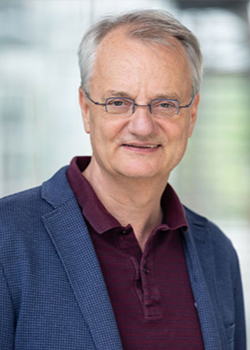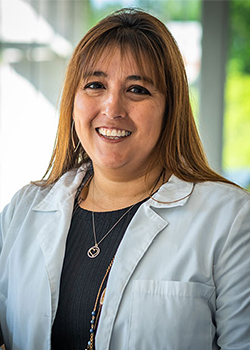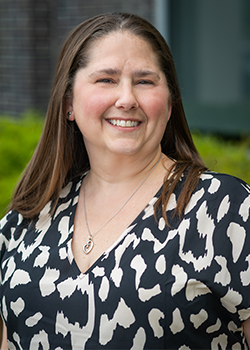About the Program
Duke Regenerative Pain Therapies Program (RPTP) offers a spectrum of treatments for musculoskeletal and arthritic conditions. These biologic therapies are designed to stimulate the body’s own healing mechanisms, improve tissue health, and resolve chronic inflammatory pain. Our treatments include autologous conditioned serum (ACS), a therapy developed by Dr. Peter Wehling, an internationally renowned expert in molecular orthopedics in Dusseldorf, Germany. Dr. Wehling is now an adjunct professor in Duke Anesthesiology and a research collaborator. Our team also works closely with researchers at Duke’s Center for Translational Pain Medicine to continuously improve the biologic and regenerative therapies offered at RPTP.
Interventions are customized to meet the needs of each individual patient.
Did you know that the cartilage loss we commonly see on joint x-rays is the result, not the cause of arthritis1? Arthritis pain and joint damage are driven by inflammatory proteins and immune cells in the joint fluid. In fact, studies show that less than half of adults with moderate to severe osteoarthritis have any pain at all2! This is good news for patients— joint pain can be improved by several treatments offered at the Duke Regenerative Pain Therapies Program.
1. Buchheit T, Huh Y, Maixner W, Cheng J, Ji RR: Neuroimmune modulation of pain and regenerative pain medicine. J Clin Invest 2020; 130: 2164-2176.
2. Hannan MT, Felson DT, Pincus T: Analysis of the discordance between radiographic changes and knee pain in osteoarthritis of the knee. The Journal of rheumatology 2000; 27: 1513-7-7.
Meet the Team
Message from the Director
Conditions Treated
-
Osteoarthritis
-
Nerve Pain
-
Degenerative Joint and Soft Tissue Disorders
-
Sacroiliac Joint and Facet Disorders
Services
Regenerative Treatments
-
Autologous Conditioned Serum (ACS)
-
Platelet-Rich Plasma
-
Prolotherapy
Other Services
-
Ultrasound-Guided Injection Therapy for Joints, Nerves, Spine, Tendons, and Ligaments
-
Physical Therapy
Evidence Based Research
Including the Team’s 2020 Publication on Mechanisms of Regenerative Pain Therapies
2021
- Simon MJK, Aartsen VE, Coghlan JA, Strahl A, Bell SN. Shoulder injections with autologous conditioned serum reduce pain and disability in glenohumeral osteoarthritis: longitudinal observational study. ANZ J Surg. 2021 Apr;91(4):673-679. doi: 10.1111/ans.16672. Epub 2021 Feb 20. PMID: 33609074.
2020
- Buchheit T, Huh Y, Maixner W, Cheng J, Ji RR. Neuroimmune modulation of pain and regenerative pain medicine. J Clin Invest. 2020 May 1;130(5):2164-2176. doi: 10.1172/JCI134439. PMID: 32250346; PMCID: PMC7190995.
- Godek P, Szajkowski S, Golicki D. Evaluation of the Effectiveness of Orthokine Therapy: Retrospective Analysis of 1000 Cases. Ortop Traumatol Rehabil. 2020 Apr 30;22(2):107-119. doi: 10.5604/01.3001.0014.1167. PMID: 32468996.
2018
- Tassara M, De Ponti A, Barzizza L, Zambelli M, Parisi C, Milani R, Santoleri L. Autologous conditioned serum (ACS) for intra-articular treatment in Osteoarthritis: Retrospective report of 28 cases. Transfus Apher Sci. 2018 Aug;57(4):573-577. doi: 10.1016/j.transci.2018.07.021. Epub 2018 Aug 8. PMID: 30131208.
- Damjanov N, Barac B, Colic J, Stevanovic V, Zekovic A, Tulic G. The efficacy and safety of autologous conditioned serum (ACS) injections compared with betamethasone and placebo injections in the treatment of chronic shoulder joint pain due to supraspinatus tendinopathy: a prospective, randomized, double-blind, controlled study. Med Ultrason. 2018 Aug 30;20(3):335-341. doi: 10.11152/mu-1495. PMID: 30167587.
- Genç E, Beytemur O, Yuksel S, Eren Y, Çağlar A, Küçükyıldırım BO, Güleç MA. Investigation of the biomechanical and histopathological effects of autologous conditioned serum on healing of Achilles tendon. Acta Orthop Traumatol Turc. 2018 May;52(3):226-231. doi: 10.1016/j.aott.2018.01.005. Epub 2018 Feb 15. PMID: 29454565; PMCID: PMC6136302.
2017
- Pecin M, Kreszinger M, Vukovic S, Lipar M, Smolec O, Radisic B, Kos J. Accelerated Achilles tendon healing with interleukin-1 receptor antagonist protein in rabbits. Turk J Vet Anim Sci. 2017:41(1):118-126.
- Arbel R: Orthokine. In A. Gobbi, J. G. Lane, J. Espregueira- Mendes, & M. Karahan (Eds.), Bio-orthopaedics: A New Approach (pp. 1–696). ISAKOS. https://doi.org/10.1007/978-3-662-54181-4.
- Caggiari G, Uboldi FM, Mosele GR, Donato A, Puddu L, Manunta A. Chondroprotective Effects of Intra-Articular Autologous Conditioned Serum (ACS) Injection A Human Literature. International Journal of Innovative Science, Engineering & Technology, 4(3), 289–293.
- Strümper R. Intra-Articular Injections of Autologous Conditioned Serum to Treat Pain from Meniscal Lesions. Sports Med Int Open. 2017 Sep 29;1(6):E200-E205. doi: 10.1055/s-0043-118625. PMID: 30539108; PMCID: PMC6259459.
- Wehling P, Evans C, Wehling J, Maixner W. Effectiveness of intra-articular therapies in osteoarthritis: a literature review. Ther Adv Musculoskelet Dis. 2017 Aug;9(8):183-196. doi: 10.1177/1759720X17712695. Epub 2017 Jun 20. PMID: 28835778; PMCID: PMC5557186.
2016
- Wehling P, Moser C, Maixner W. How does surgery compare with advanced intra-articular therapies in knee osteoarthritis: current thoughts. Ther Adv Musculoskelet Dis. 2016 Jun;8(3):72-85. doi: 10.1177/1759720X16642405. Epub 2016 Apr 18. PMID: 27247634; PMCID: PMC4872173.
- Evans CH, Chevalier X, Wehling P. Autologous Conditioned Serum. Phys Med Rehabil Clin N Am. 2016 Nov;27(4):893-908. doi: 10.1016/j.pmr.2016.06.003. PMID: 27788906.
- Godek P. Use of Autologous Serum in Treatment of Lumbar Radiculopathy Pain. Pilot Study. Ortop Traumatol Rehabil. 2016 Jan-Feb;18(1):11-20. doi: 10.5604/15093492.1198829. PMID: 27053305.
- Richards MM, Maxwell JS, Weng L, Angelos MG, Golzarian J. Intra-articular treatment of knee osteoarthritis: from anti-inflammatories to products of regenerative medicine. Phys Sportsmed. 2016;44(2):101-8. doi: 10.1080/00913847.2016.1168272. Epub 2016 Apr 4. PMID: 26985986; PMCID: PMC4932822.
2015
- Frisbie DD. Autologous-conditioned serum: evidence for use in the knee. J Knee Surg. 2015 Feb;28(1):63-6. doi: 10.1055/s-0034-1543956. Epub 2015 Jan 19. PMID: 25599270.
- Baselga García-Escudero J, Miguel Hernández Trillos P. Treatment of Osteoarthritis of the Knee with a Combination of Autologous Conditioned Serum and Physiotherapy: A Two-Year Observational Study. PLoS One. 2015 Dec 28;10(12):e0145551. doi: 10.1371/journal.pone.0145551. PMID: 26709697; PMCID: PMC4692499.
- Geburek F, Lietzau M, Beineke A, Rohn K, Stadler PM. Effect of a single injection of autologous conditioned serum (ACS) on tendon healing in equine naturally occurring tendinopathies. Stem Cell Res Ther. 2015 Jun 26;6(1):126. doi: 10.1186/s13287-015-0115-0. PMID: 26113022; PMCID: PMC4513386.
- Torrero JI, Martínez C. New developments in the treatment of osteoarthritis - focus on biologic agents. Open Access Rheumatol. 2015 Jul 22;7:33-43. doi: 10.2147/OARRR.S50058. PMID: 27790043; PMCID: PMC5045124.
2014
- Astolfi M, McGuire K, Kaminski TW. The effectiveness of autologous conditioned serum in the treatment of knee osteoarthritis. J Sport Rehabil. 2014 Nov;23(4):365-9. doi: 10.1123/jsr.2013-0029. Epub 2014 May 2. PMID: 24810293.
- Beyzadeoglu T: Cytokines in Sports Medicine. ISAKOS NEWSLETTER 2014: Volume I. Current Concepts, 1–44.
- Majewski M, von Wehren L, Blanke F. Treatment Of Achillodynia With Local Injections Of Autologous Conditioned Serum (acs). British Journal of Sports Medicine, 48(Suppl_2), A38–A39. http://doi.org/10.1136/bjsports-2014-094114.60.
2013
- Alvarez-Camino JC, Vázquez-Delgado E, Gay-Escoda C. Use of autologous conditioned serum (Orthokine) for the treatment of the degenerative osteoarthritis of the temporomandibular joint. Review of the literature. Med Oral Patol Oral Cir Bucal. 2013 May 1;18(3):e433-8. doi: 10.4317/medoral.18373. PMID: 23524415; PMCID: PMC3668869.
- Frizziero A, Giannotti E, Oliva F, Masiero S, Maffulli N. Autologous conditioned serum for the treatment of osteoarthritis and other possible applications in musculoskeletal disorders. Br Med Bull. 2013;105:169-84. doi: 10.1093/bmb/lds016. Epub 2012 Jul 4. PMID: 22763153.
- Baltzer AW, Ostapczuk MS, Stosch D, Seidel F, Granrath M. A new treatment for hip osteoarthritis: clinical evidence for the efficacy of autologous conditioned serum. Orthop Rev (Pavia). 2013 Jun 14;5(2):59-64. doi: 10.4081/or.2013.e13. PMID: 23888203; PMCID: PMC3718237.
- Weisshaar MP, Gaji S. Signaling Proteins (Growth Factors and Cytokines) in Orthopaedics. Comparison of two blood processing techniques: ORTHOKINE® and ACP®. CORS congress 2013 Venice, Italy.
- MorgensternDRetal.:Adjunctive Biological Treatment for Degenerative Hip Disease with Focal Chondro Labral Defects. ISHA Annual Meeting, Munich, Poster 58 (2013).
2012
- Heisterbach PE, Todorov A, Flückiger R, Evans CH, Majewski M. Effect of BMP-12, TGF-β1 and autologous conditioned serum on growth factor expression in Achilles tendon healing. Knee Surg Sports Traumatol Arthrosc. 2012 Oct;20(10):1907-14. doi: 10.1007/s00167-011-1772-x. Epub 2011 Nov 29. PMID: 22124845.
2011
- Textor J. Autologous biologic treatment for equine musculoskeletal injuries: platelet-rich plasma and IL-1 receptor antagonist protein. Vet Clin North Am Equine Pract. 2011 Aug;27(2):275-98. doi: 10.1016/j.cveq.2011.05.001. PMID: 21872759.
- Darabos N, Haspl M, Moser C, Darabos A, Bartolek D, Groenemeyer D. Intraarticular application of autologous conditioned serum (ACS) reduces bone tunnel widening after ACL reconstructive surgery in a randomized controlled trial. Knee Surg Sports Traumatol Arthrosc. 2011 Dec;19 Suppl 1:S36-46. doi: 10.1007/s00167-011-1458-4. Epub 2011 Mar 1. Erratum in: Knee Surg Sports Traumatol Arthrosc. 2019 Apr;27(4):1355. PMID: 21360125.
- Geburek F, Stadler P. Regenerative Therapie von Sehnen- und Banderkrankungen bei Pferden. Terminologie, Herstellung, biologisches Potenzial und In-vitro-Effekte [Regenerative therapy for tendon and ligament disorders in horses. Terminology, production, biologic potential and in vitro effects]. Tierarztl Prax Ausg G Grosstiere Nutztiere. 2011;39(6):373-83. German. PMID: 22167082.
2010
- Fox BA, Stephens MM. Treatment of knee osteoarthritis with Orthokine-derived autologous conditioned serum. Expert Rev Clin Immunol. 2010 May;6(3):335-45. doi: 10.1586/eci.10.17. PMID: 20441419.
2009
- Wehling P et al.: Use of Autologous Conditioned Cell-free Serum (ORTHOKINE®) in Treating Osteoarthritis and Sciatic Back Pain. European Musculoskeletal Review (2009) 4(1): 8–11.
- Majewski M, Ochsner PE, Liu F, Flückiger R, Evans CH. Accelerated healing of the rat Achilles tendon in response to autologous conditioned serum. Am J Sports Med. 2009 Nov;37(11):2117-25. doi: 10.1177/0363546509348047. PMID: 19875360.
- Chevalier X, Goupille P, Beaulieu AD, Burch FX, Bensen WG, Conrozier T, Loeuille D, Kivitz AJ, Silver D, Appleton BE. Intraarticular injection of anakinra in osteoarthritis of the knee: a multicenter, randomized, double-blind, placebo-controlled study. Arthritis Rheum. 2009 Mar 15;61(3):344-52. doi: 10.1002/art.24096. PMID: 19248129.
- Baltzer AW, Moser C, Jansen SA, Krauspe R. Autologous conditioned serum (Orthokine) is an effective treatment for knee osteoarthritis. Osteoarthritis Cartilage. 2009 Feb;17(2):152-60. doi: 10.1016/j.joca.2008.06.014. Epub 2008 Jul 31. PMID: 18674932.
- Darabos N, Hundric-Haspl Z, Haspl M, Markotic A, Darabos A, Moser C. Correlation between synovial fluid and serum IL-1beta levels after ACL surgery-preliminary report. Int Orthop. 2009 Apr;33(2):413-8. doi: 10.1007/s00264-008-0649-1. Epub 2008 Aug 27. PMID: 18751702; PMCID: PMC2899090.
2008
- Auw Yang KG, Raijmakers NJ, van Arkel ER, Caron JJ, Rijk PC, Willems WJ, Zijl JA, Verbout AJ, Dhert WJ, Saris DB. Autologous interleukin-1 receptor antagonist improves function and symptoms in osteoarthritis when compared to placebo in a prospective randomized controlled trial. Osteoarthritis Cartilage. 2008 Apr;16(4):498-505. doi: 10.1016/j.joca.2007.07.008. Epub 2007 Sep 6. PMID: 17825587.
- Österdahl J. Evaluation of autologous conditioned serum. Degree project 2008:67 at Swedish University of Agricultural Sciences, Uppsala (2008) ISSN 1652-8697.
- Creaney L, Hamilton B. Growth factor delivery methods in the management of sports injuries: the state of play. Br J Sports Med. 2008 May;42(5):314-20. doi: 10.1136/bjsm.2007.040071. Epub 2007 Nov 5. PMID: 17984193.
- Jöstingmeier U. Vergleichende Betrachtung des Behandlungserfolges der intra-artikulären kombi- nierten Behandlung mit Natriumhyaluronat und Betamethason mit der intraartikulären Behandlung mit autologem konditionierten Serum (IL-1Ra) bei Pferden mit positiver Hufgelenksanästhesie – Eine Anwendungsbeobachtung. In-augural-Dissertation an der Freien Universität Berlin (2008) ISBN 978-3- 86664-665-0.
- Martinelli MJ, et al. Biochemical Characterization and Clinical Assessment of Autologous Conditioned Serum Treatment in Race Horses. Annual Meeting of the Orthopaedic Research Society 2008, San Francisco, USA.
- Weinberger T. Klinische Erfahrungen mit der Anwendung von ACS / ORTHOKIN® / IRAP beim Pferd. pferde spiegel 3/2008.
- Weinberger T. Clinical experience with ACS/ORTHOKINE/IRAP in horses. Equine Sports Medicine 3/2008.
- Weinberger T. Regenerative Therapiemöglichkeiten beim Pferd – eine Übersicht. pferde spiegel 3/2008
2007
- Becker C, Heidersdorf S, Drewlo S, de Rodriguez SZ, Krämer J, Willburger RE. Efficacy of epidural perineural injections with autologous conditioned serum for lumbar radicular compression: an investigator-initiated, prospective, double-blind, reference-controlled study. Spine (Phila Pa 1976). 2007 Aug 1;32(17):1803-8. doi: 10.1097/BRS.0b013e3181076514. Erratum in: Spine. 2007 Nov 15;32(24):table of contents. Dosage error in article text. PMID: 17762286.
- Frisbie DD, Kawcak CE, Werpy NM, Park RD, McIlwraith CW. Clinical, biochemical, and histologic effects of intra-articular administration of autologous conditioned serum in horses with experimentally induced osteoarthritis. Am J Vet Res. 2007 Mar;68(3):290-6. doi: 10.2460/ajvr.68.3.290. PMID: 17331019.
- Wehling P, Moser C, Frisbie D, McIlwraith CW, Kawcak CE, Krauspe R, Reinecke JA. Autologous conditioned serum in the treatment of orthopedic diseases: the orthokine therapy. BioDrugs. 2007;21(5):323-32. doi: 10.2165/00063030-200721050-00004. PMID: 17896838.
2006
- Glawe H: ORTHOKIN®-Therapie: Autologes Conditioniertes Serum an der Wirbelsäule. Eine Anwen- dungsbeobachtung an 261 Patienten. Poster 2006.
- Theodoridis T, Krämer J: Interleukin-1-Rezeptor-Antagonist-Protein (IRAP). In: Injektionstherapie an der Wirbelsäule. Manual und Atlas, 37-40. Georg Thieme Verlag (2006) ISBN 3-13-141041-8A.
2005
- Moser C, Baltzer A, Reinecke J, Wehling P. Die Rolle der Zytokine bei Knorpeldefekten und in der Knorpeltherapie. Interleukin-1 und TNF-a: Schlüsselfaktoren der Knorpeldestruktion. Arthroskopie. 2005;18(3):181–185.
- Levy E, Tornell J, Weinberger T, Koene M. Intraartikuläre Behandlung mit autologem IRAP® conditionierten Serum – Teil 1. pferde spiegel 2005; 8(3): 120-124.
- Hague BA: Clinical Impression of ORTHOKINE (IRAP) Treating Joint Disease in the Performance Horse. ACVS conference 2005, San Diego, USA.
2004
- Wright-Carpenter T, Opolon P, Appell HJ, Meijer H, Wehling P, Mir LM. Treatment of muscle injuries by local administration of autologous conditioned serum: animal experiments using a muscle contusion model. Int J Sports Med. 2004 Nov;25(8):582-7. doi: 10.1055/s-2004-821303. PMID: 15532000.
- Wright-Carpenter T, Klein P, Schäferhoff P, Appell HJ, Mir LM, Wehling P. Treatment of muscle injuries by local administration of autologous conditioned serum: a pilot study on sportsmen with muscle strains. Int J Sports Med. 2004 Nov;25(8):588-93. doi: 10.1055/s-2004-821304. PMID: 15532001.
2003
- Meijer H, Reinecke J, Becker C, Tholen G, Wehling P. The production of anti-inflammatory cytokines in whole blood by physico-chemical induction. Inflamm Res. 2003 Oct;52(10):404-7. doi: 10.1007/s00011-003-1197-1. PMID: 14520515.
- Baltzer AWA, Drever R, Granrath M, Godde G, Klein W, Wehling P. Intraartikuläre Therapie der Gonarthrose mit autologem Interleukin-1 Rezeptor Ant- agonisten (IL-1Ra). Deutsche Zeitschrift für Sportmedizin. 2003;54(6): 209–211,
Updated: February 2023



